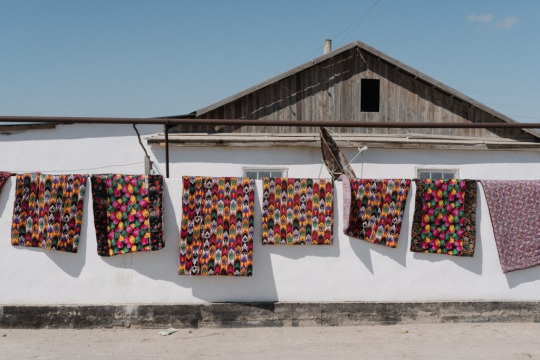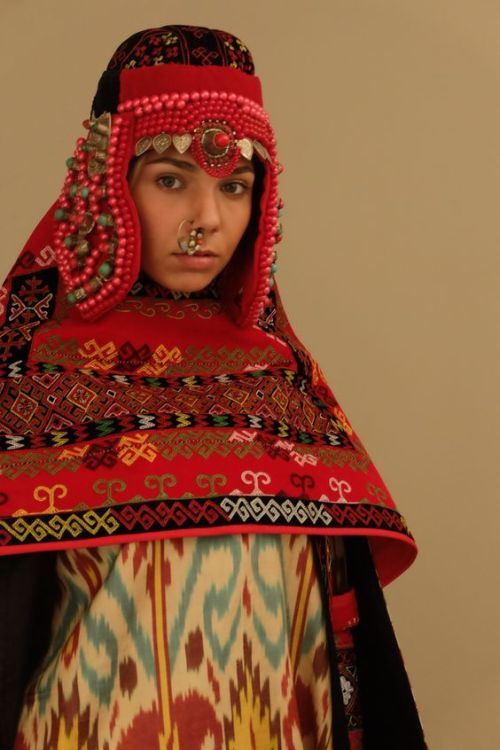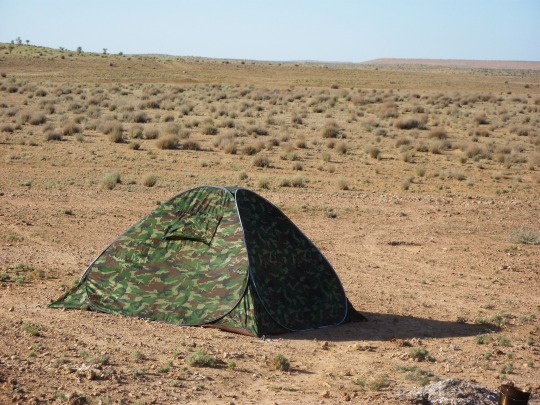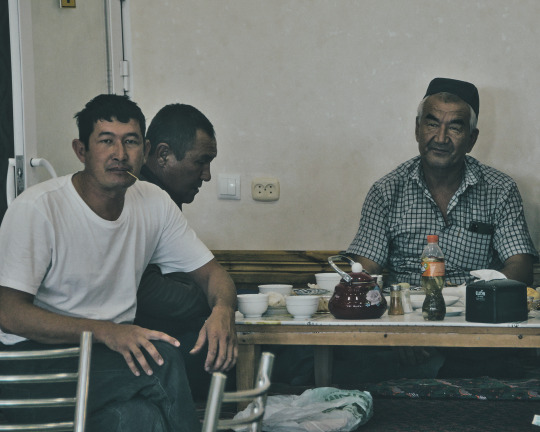#karakalpakstan
Explore tagged Tumblr posts
Text

Kourpashas, traditional Uzbek carpets, which adorn the homes of every household, dry in the sun in Moynaq, Karakalpakstan, western Uzbekistan.
By Timur Karpov (source)
178 notes
·
View notes
Text

Qaraqalpaq Girl
#central asian#turkic#turanism#turan#asian#turkic people#eurasian#turkics#Karakalpak#Qaraqalpaqs#Karakalpakstan#Uzbekistan
96 notes
·
View notes
Text

Shamun-Nabi Mausoleum - Mizdakhan, 2022
#picofthenight#travel#uzbekistan#karakalpakstan#original photographers#photographers on tumblr#ancient architecture#ancient art#ancient tomb#geometric shapes#arcade#photoofthenight
27 notes
·
View notes
Text
Uzbekistan: 2 Years on, No Justice in Autonomous Republic
Karakalpakstan Independence Activists Targeted, Imprisoned

(Berlin, July 1, 2024) – Uzbekistan authorities have increasingly cracked down on calls for independence in the autonomous republic of Karakalpakstan since protests broke out there two years ago, Human Rights Watch said today.
But Uzbekistan has also yet to hold any senior officials accountable for the excessive force used to quell the protests against proposed constitutional amendments in July 2022. The amendments would have stripped the region of its autonomous status and barred a referendum for independence.
“Uzbekistan’s leadership has not only failed to ensure justice for those killed in the Karakalpakstan protests two years ago, but we’ve also seen a notable increase in repression of other Karakalpak activists ever since,” said Hugh Williamson, Europe and Central Asia director at Human Rights Watch. “Uzbekistan’s partners should renew calls for justice and condemn the ongoing crackdown on activists both inside and outside Karakalpakstan.”
On July 1 and 2, 2022, Uzbekistan’s security forces used unjustified lethal force and other forms of excessive force, including discharging small arms and grenades to disperse mainly peaceful protesters in Karakalpakstan. At least 21 people died, including 4 law enforcement officers. Over 270 were injured.
Uzbek authorities backed off the proposed constitutional changes, but they have since taken a heavy hand to anyone who has spoken out or acted in favor of Karakalpakstan’s independence.
The authorities arrested more than 500 people in the immediate aftermath of the protests, and in two high-profile criminal trials, prosecuted a total of 61 people, including lawyers, bloggers, activists, and journalists, for their alleged involvement. Dauletmurat Tazhimuratov, a blogger and lawyer who first called for peaceful protests, was sentenced to 16 years in prison. Police and the courts ignored his allegations of ill-treatment and torture.
6 notes
·
View notes
Text
So im still working on some central asia ocs and there's this autonomous region within uzbekistan i wanted to make named karakalpakstan. I wanted to look at other people's ocs to use for reference but I quickly found out that there is literally no hetalia karakalpakstan oc out there. the closest ive found is karakalpakstan being mentioned as another country's sibling in some roleplay forum from 2017
I found it kind of surprising, but to be fair most people on earth probably wouldn't be able to locate uzbekistan on a map, let alone know what or where karakalpakstan is. So anyways here is the first hetalia karakalpakstan oc on the internet I think

i feel like i made him look like uzbekistan when in reality it would make more sense to make him look more like kazakhstan. but the eye lines are cute!!!!1!!!
I think karakalpakstan would have a timid and conservative personality, as well as being a stickler to tradition and etiquette. since hes not "officially" a country, i think he would probably be ≤18. His relationship with uzbekistan is probably mixed, but i think uzbekistan would view himself as some sort of older brother figure towards him. I also think he would be friendly with kazakhstan and hangs out with him from time to time.
i hope i get to develop him more in the future tbh, even though interactions with other nations will be limited considering... yknow. If there's something you would add or changes you would make pls let me know. This region feels so obscure that I have a feeling there's some information I can only get from..... talking to people...... shivers
#hetalia#aph#hws#aph karakalpakstan#hws karakalpakstan#hetalia oc#im a little shy about posting this so ill schedule it instead
54 notes
·
View notes
Text
I feel like kazakhstan and kyrgyzstan would understand turkey better than uzb lol
a lot of words in kipchak languages are similar to words in turkish, whereas in uzbek we have a lot more persian in the mix:
the word "meat" in 🇹🇷🇰🇿🇰🇬: et
the word "meat" in 🇺🇿🇹🇯🇮🇷: gosht
the word "honey" in 🇹🇷🇰🇿🇰🇬: bal
the word "honey" in 🇺🇿🇹🇯🇮🇷: asal
there's other examples I just can't think of them now lol
#bottom line being uzb works harder to understand turkish#shes too persian of a turkic 😔#but thats why she gets along with tajik !#hetalia#aph uzbekistan#hws uzbekistan#nargiza yusufqizi#aph kazakhstan#hws kazakhstan#aph kyrgyzstan#hws kyrgyzstan#aph turkey#hws turkey#tokki rambles#however!! places like karakalpakstan and khorezm also use words like et and bal im sure#turkuzbek#can i tag as such?
21 notes
·
View notes
Text

Photography 4 Humanity 2023 GLOBAL PRIZE
Recipient: Kristina Varaksina
Title: The Seashore is No Longer Here
Description: ”School girls stand in an abandoned seaport town next to an installation showing where the Aral Sea used to come."
Location: Karakalpakstan, Uzbekistan
207 notes
·
View notes
Note
She doesn't even mention the character's name (Geneva)😂
.
.
https://www.tumblr.com/bat-cat-reader/747585779840237568/ask
Dear Geneva Anon,
Irish people are feisty, boisterous, addictive, sentimental and larger than life. They also tend to often be jealous as hell(water - wee lame joke, again) and possessive, without ever admitting to it.
I very clearly remember an intercontinental tantrum thrown by Someone (1/2 Irish) by email (!), when I was traveling alone along the Silk Road and reached the Karakum Desert in Turkmenistan, visiting the Darvaza gas crater and sleeping in a tent under the stars, in the lunar emptiness we usually call the middle of nowhere. An Internet curfew made any contact impossible until I finally reached the Uzbek Karakalpakstan province, some five days later. I then found a truckload of WHERE ARE YOU? I AM SICK WITH WORRY. DO NOT PLAY GAMES WITH ME WOMAN emails, ranging from an improvised rubaiyat to pleading in at least three languages of shared use. That was 2010, Anon, and he knew perfectly well where the hell I was during all that time (he started the bet that sent me there and he planned the whole trip, FFS!) - still, bless his heart, could not help himself.
As far as I and my own life experience are concerned, FWIW, Anon the answer to your unasked question is a resounding yes. And I bet she would gladly send anytime that foolish Geneva girl straight through that Darvaza gas crater, aka the Door to Hell. Here, Anon, I found the pics of that desert road trip for you:

Also, the tent: the strangest night in my entire life, easily.

But you know what, Anon? I wasn't really interested by that BTS Season 2 tidbit, to be perfectly honest with you. Those banging pots, pans and that coughing boiler were far more telling than anything else.
Amen. Hope my convoluted answer helped, somehow.
33 notes
·
View notes
Text



Regional Flag Wars: Round 1, Bracket 27
13 notes
·
View notes
Text
Thinking of telling the other founders to make tumblr accounts and inviting them to post on this blog.
And some gimmick tags for this poll bc why not:
@non-tyrannical-usa @communist-usa-real3 @real-british-empire @france-unofficial @france-the-third @officially-latvia @maryland-no-rabies @real-microsoft-outlook @real-karakalpakstan @official-ottawa and I'm tired of typing so if anyone wants to tag more gimmicks go at it I guess
6 notes
·
View notes
Text
This summer, Uzbek President Shavkat Mirziyoyev announced plans for a referendum to amend the country’s constitution. Following the lead of Kazakhstani President Tokayev, Mirziyoyev claimed the changes would be a step towards greater democracy, but the main question among observers was whether he would use the initiative to reset his presidential term count. However, when a draft version of the amendments was published in late July, it included an even more drastic change: the proposed legislation would strip the country’s autonomous republic of Karakalpakstan of its status as a sovereign republic and of its right to secede from Uzbekistan via referendum. Karakalpakstan makes up more than a third of Uzbekistan’s territory, and secession rights were a key part of the 1993 reunification agreement signed by Uzbekistan and Karakalpakstan in the wake of the Soviet collapse. Mirziyoyev’s proposal sparked large-scale demonstrations in the republic, and the authorities responded with violent force and severe criminal charges against protesters. After their sentences were handed down on January 31, the independent outlet Mediazona Central Asia spoke to multiple experts about Tashkent’s handling of the situation and what it means for the country’s future. Meduza is publishing an abridged translation of Mediazona’s report.
The joint legacy of Stalin and Karimov
In late June 2022, the Uzbek government published draft constitutional amendments that would deprive the Republic of Karakalpakstan of its right to secede from Uzbekistan via referendum. In the days that followed, widespread protests broke out in the republic’s capital of Nukus and in other cities throughout the region as residents demanded the amendments be withdrawn. Within days, the demonstrations grew into violent clashes as law enforcement used lethal force to disperse the protesters.
According to official sources, Uzbek law enforcement officers arrested more than 500 demonstrators, including Nukus lawyer and journalist Dauletmurat Tazhimuratov and journalist Lolagul Kallykhanova, whom prosecutors accused of organizing the protests.
On July 2, the second day of the demonstrations, Uzbek President Shavkat Mirziyoyev flew to Nukuz, where he announced that the Karakalpakstan-related initiatives would be removed from the amendments package. Meanwhile, the authorities declared a state of emergency in the republic that remained in effect until July 21.
By official counts, 21 people (including four security officials) were killed in the unrest, and at least 200 protesters were injured. But according to opposition politician Aman Sagidullayev, the true number of victims is much higher. He told Mediazona that he estimates at least 300 people may have been killed and more than 1,000 injured.
The investigation that followed the clashes lasted nearly five months and resulted in criminal charges against 22 people. Each of the defendants was charged with multiple crimes, including conspiracy to seize power and the organization of mass riots.
The trial against the protesters began on November 28. Instead of Nukus, where the alleged crimes took place, the authorities opted to hold the proceedings hundreds of miles away, in Bukhara, claiming this was necessary due to renovations in the Nukus court building.
But Alisher Ilkhamov, director of the London-based think tank Central Asia Due Diligence, told Mediazona that he believes the court proceedings were moved to limit the number of relatives and friends of the defendants who could attend the hearings. Those people’s very presence in the court would have created an “atmosphere of pressure,” said Ilkhamov.
“I want to note that the proceedings were moved not to Uzbekistan’s Khorezm region, which neighbors Karakalpakstan, but to Bukhara. And many of the defendants’ relatives simply can’t afford the trip,” he said.
Ilkhmanov said he even knows of cases in which familiar members of the people on trial sold livestock in order to attend the hearings. And in addition to being far away, he said, the authorities chose a facility that was far too small to accommodate everyone who wanted to be there.
“Bukhara isn’t a very big city, and the influx of people planning to be in the court caused a shortage of hotels and a sharp price increase. All of these factors made it even more difficult for Karakalpakstan residents to attend the hearings,” he said.
As for the charges themselves, Ilkhamov has no doubt that they’re politically motivated. “The proceedings resemble Stalin’s show trials, which were both illegitimate in a legal sense and also made public to intimidate society, to give an example of how the authorities are able to deal with real or imagined opponents. And these politically motivated trials, which have nothing to do with the rule of law, were widespread in Uzbekistan under the regime of Islam Karimov,” he said.
Aman Sagidullayev, the Norway-based leader of the Alga Karakalpakstan movement, described the trial in Bukhara as a “kangaroo court.” He told Mediazona that there are effectively no independent lawyers to be found in Uzbekistan and especially in Karakalpakstan.
“[As a result,] trials resemble games in which people play at transparency and democracy. But we know that from the moment the activists were arrested, their rights have constantly been violated; we’ve observed torture and illegal searches. For example, from the first day of his arrest, Dauletmurat Tazhimuratov asked for an investigator who speaks Karakalpak, as well as glasses so he can read the court documents, but nobody wanted to listen to his requests,” said Sagidullayev.
Halfway measures
Most of the proceedings were broadcast via livestream on the court’s site, a rarity for Uzbekistan. Alisher Ilkhamov admits that this alone is a step in the direction of transparency, but at the same time, he notes, at a certain point the broadcast was cut off and the press barred from the courtroom:
It happened when certain interesting details that discredited the authorities were revealed. For example, Tazhimuratov spoke about how, while he was reading the materials compiled by investigators, he stumbled upon information about injured protesters: someone had a bullet in their chest, someone had grenade fragments in their head. That means that, in addition to using riot control weapons to disperse demonstrations, law enforcement used firearms, which explains why the number of victims is so high. According to official data, 21 people were killed. But the medical personnel who dealt with the bodies and the injuries during the Nukus events claimed that 77 bodies were delivered to the hospital. So, the Uzbek authorities didn’t succeed in fully showing the openness of the process, and they were forced to curtail this initiative.
Most of the defendants, however, showed no such willingness to criticize the authorities. On the contrary, they repented their alleged crimes, asked the president and the Uzbek people for forgiveness using phrases that were strikingly similar to one another, and condemned Tazhimuratov, who they claimed had misled them and forced them to join the protests and throw Molotov cocktails.
Tazhimuratov himself asked the court to let him speak “at the very end, after everybody else,” saying he hadn’t expected the other defendants to betray him and “slander” him. In his final statement on January 20, he started by noting that all of his co-defendants had unanimously praised the prison food, their detainment conditions, and the way they had been treated by prison guards, which he described as “suspicious.”
Aman Sagidullayev said that it’s indeed likely that investigators and lawyers promised the other defendants lighter sentences in exchange for giving the “necessary testimonies.” In his experience, he said, many of the lawyers assigned to cases like Tazhimuratov’s are former law enforcement officials, and their primary role is to serve as an “intermediary between the prosecutor and the judge.”
“I know that one of the defendants, Azamat Turdanov, was subjected to torture and pleaded guilty after they broke the leg of his younger brother, who was in prison,” he told Mediazona. “[In this case,] the Uzbek authorities’ target was Dauletmurat Tazhimuratov, so they took measures to ensure that people would slander him.”
Prosecutors, unsurprisingly, requested prison sentences for all of the defendants. The harshest sentences were requested for Dauletmurat Tazhimuratov and Lolagul Kallykhanova: 18 and 11 years in prison, respectively.
Tazhimuratov pleaded not guilty to most of the charges against him, including the claim that he incited mass riots. At the same time, while he maintained that he “wasn’t trying to achieve independence,” he also insisted that nobody can ban him from yearning for it. “Dreaming about independence isn’t a crime. I’ll continue to dream; I’ll dream until I’m in the grave. […] Release me now, and I won’t take a step towards independence, but my dream won’t fade,” he vowed.
In his closing statement, Tazhimuratov also addressed the violence and abuse he endured at the hands of law enforcement. On July 1, he said, he was taken in for a “preventative conversation” that ended in a beating. “A preventative conversation in the new Uzbekistan is where they put a mask and handcuffs on you and put you in a police van, jab you and jab you with a stun gun, beat you, make you spit up blood, and then release you,” he said.
The following day, he said, security officials showed up at his home — without warrants. “They broke the doors, the gates, the windows, and entered the building. They took several people away to the police station. […] There, they put us in an isolation unit. They put us right into prison without any warrants or court orders,” he said.
Aman Sagidullayev doesn’t believe any law enforcement officials will be punished for using violence against civilians during the protests or their aftermath. “The investigation against the Uzbek military for using force during the Nukus events looks like a farce,” he said. “We still don’t know who fired, what weapons were used, or who gave the command. They don’t even seem to have arrested anybody.”
No surprise
On January 31, the court found Dauletmurat Tazhimuratov guilty of conspiracy to seize power, embezzlement, money laundering, organizing mass unrest, and disseminating materials that threaten public safety. He was sentenced to 16 years in prison — two years fewer than prosecutors had requested.
Most of the other defendants were given sentences of between three and five years in prison. Lolagul Kallykhanova received an eight-year parole-like sentence, while three others were given probation and immediately released from custody.
Alisher Ulkhamov sees these sentences as an attempt by the Uzbek authorities to minimize the damage to their own reputation after a trial that was clearly political in nature. “At first glance, the outcome looks like a compromise; after all, four people, including the only woman on the list of defendants, Kallykhanova, were given probation. But in reality, there was no compromise — the informal leader of the Karakalpaks, Tazhimuratov, was given only two years fewer than what prosecutors requested,” he said.
But at the same time, he said, he expects the ruling to cement Tazhimuratov’s status as a hero throughout the region.
“In his closing statement, [Tazhimuratov] ripped the prosecutors to shreds, pointing out the contradictions [in their claims] and their bias. Judging by his dignified behavior after his sentencing, I suspect he may now become a martyr in the eyes of the people of Karakalpakstan,” he said.
Ilkhmanov compared the situation in Karakalpakstan to a “time bomb” and said he doesn’t expect the authorities’ retribution against the protesters to defuse it:
It’s quite possible that the situation will develop along the same path as Kosovo, where things also began with some minor demonstrations and unjust legal rulings, but they ended with the region’s exit from Serbia. That scenario is highly likely in Karakalpakstan. At the same time, against the backdrop of this political crisis and the recent energy collapse, the government is rapidly losing authority, which could intensify its repressions. Which is why, right now, the odds of the country returning to the old Karimov order have grown significantly.
Aman Sagidullayev, the leader of the Alga Karakalpakstan movement, says that he wouldn’t have expected any other decision from the court. “I knew that the sentence would be harsh because the Uzbek president backs this show trial. Bearing in mind that human rights advocate [and Karakalpak independence advocate Zhumasapar] Dadebayev, who was kidnapped in Turkey and taken to Tashkent, was sentenced to 12 years in prison in 2022, I expected this kind of punishment for Tazhimuratov too,” he said.
4 notes
·
View notes
Photo

Truck drivers in a truck stop roadside - Karakalpakstan, 2022
#picoftheday#travel#uzbekistan#original photographers#photographers on tumblr#street portrait#streetphoto color#truck stop#drivers#portrait#street life#photooftheday
53 notes
·
View notes
Text

Poverty rate in Uzbekistan decreases to 8.9% in 2024
In 2024, Uzbekistan’s poverty rate decreased from 11% to 8.9%, representing a reduction of 3.3 million people living in poverty, 719,000 fewer than in 2023.
This data was provided by the Center for Economic Research and Reforms, based on information from the Statistics Agency under the President and the Ministry of Employment and Poverty Reduction, with assessments conducted in collaboration with the World Bank using international calculation methodologies. The methodology involves studying household budgets across the country throughout the year.
The most significant poverty reductions were recorded in Bukhara Region (from 11.8% to 8.7%), Samarkand Region (from 10.5% to 7.5%), Namangan Region (from 10.4% to 7.6%), and the Republic of Karakalpakstan (from 13.6% to 10.8%).
The primary factors contributing to the reduction in poverty were measures aimed at ensuring employment, supporting entrepreneurship, and improving the efficiency of land use for agriculture and horticulture.
In 2024, real household incomes grew by 10.7%, reaching an average of 2.1 million soums per person per month, up from 1.7 million soums at the beginning of the year.
The income structure is distributed as follows:
Wages: 42.6% (compared to 41.9% in 2023)
Entrepreneurial income: 22.9% (21.4%)
Pensions, social benefits, and subsidies: 18.2% (18.9%)
Income from agriculture and horticulture: 10.7% (9.8%)
Remittances from abroad: 2.0% (3.1%)
Other income: 3.6% (4.9%)
Wage income increased by 12.9% compared to 2023.
0 notes
Text
“Uzbekistan: l'Avanguardia nel deserto” torna a casa nel museo di Nukus
Dopo lo straordinario consenso di pubblico e critica delle due mostre aperte in Italia in primavera, a Palazzo Pitti a Firenze e a Ca’ Foscari Esposizioni, a Venezia, “Uzbekistan: Avant-Garde in the Desert” riapre a Nukus nel Museo Statale delle Arti del Karakalpakstan, intitolato a I.V. Savickij, grazie alla rielaborazione del progetto espositivo realizzata dal team cafoscarino.Il nuovo…
0 notes
Note
karakalpakstan kisser 🫵
I DON'T KNOW WHO THAT IS!?!?
#scheduled for 12 am because post limit#croatia answers#croatia = best country#gimmickverse#into the gimmickverse#country verse#countryverse#gimmick account#gimmick blog#main blog is crystalsandbubbletea
0 notes
